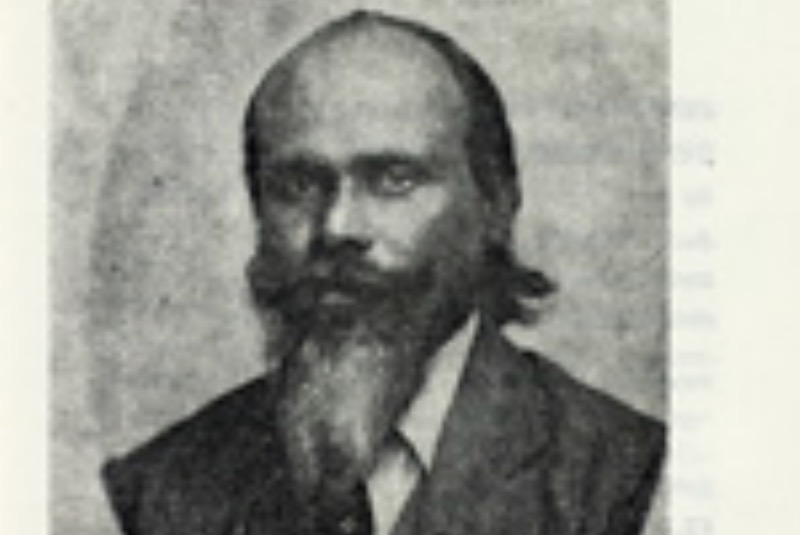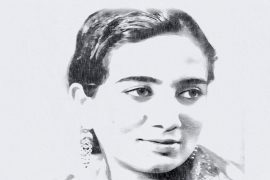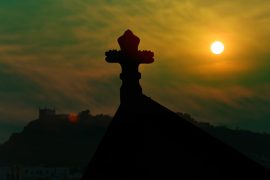Abraham Barak Salem, a member of the Legislative Council in the Kingdom of Cochin, submitted a bill in August 1941 to make education free and compulsory. The Maharajah of Cochin signed the bill into law on August 13, 1947.
The law was one of the elements that contributed to Kerala, which today encompasses the old Kingdom of Cochin, having high literacy and advanced education levels. Kerala now has the highest literacy rate in India, at 93.91 per cent as per the 2011 census.
Salem is known as the Jewish Gandhi of Cochin, and for a good reason. He was the first Kochi Jew to become a lawyer; then, he became one of the most well-known politicians in the community. He adopted the methods of Satyagraha to fight for Meshuchrarim, the sect of excluded Jews who were discriminated against within the community. Salem himself was a descendant of Meshuchrarim.
Meshuchrarim Jews of mixed African-European descent accompanied Sephardic Jews after their expulsion from Spain. While the Sephardic Jews became the ‘Paradesi Jews’ or ‘White Jews,’ Meshuchrarim Jews were discriminated against for their skin colour and fit at the bottom of the ‘Jewish caste ladder.’ The term itself had derogatory intent, denoting the past as a slave or gerim (converts).
After the first Synagogue of Cochin was destroyed in the sixteenth- century during the Portuguese persecution of the Jews, they built a second one under the protection of the Raja of Cochin in 1558. Built in Mattancherry, ‘Paradesi Synagogue’ is the oldest surviving Synagogue in India.
The Synagogue recognises three classes of Jewish members: The ‘white Jews’ or the ‘Pardesi Jews,’ who were the descendants of Sephardim coming from Spain, Portugal, and the Netherlands; the ‘Black Jews’ or the ‘Malabari Jews,’ who were the original settlers of Cochin; and the ‘Meshuchrarim,’ the freed slaves of African-European descent.
There were eight synagogues in Kerala; seven of them belonged to the ‘Black Jews,’ one belonged to ‘Paradesi Jews,’ and none to the Meshuchrarim. The ‘White Jews’ were only recognised as ‘full members’ of the Paradesi synagogue. While the ‘Black Jews’ were not given full membership, they were allowed to worship.
Meshuchrarim, on the other hand, had no communal rights. They had to sit on the floors or on the steps outside to worship. Salem successfully campaigned against this discrimination in the early twentieth century.
Salem was born in 1882 in Cochin and attended the Maharaja’s College in Ernakulam. He earned his Bachelor of Arts in Chennai, becoming the first Meshuchrarim to graduate with a university degree. He earned a law degree and became the first Jewish Lawyer from Cochin. He practised as a lawyer in Ernakulam at the Cochin Chief Court.
The worship places of ‘Malabari Jews’ and ‘Pardesi Jews’ barred Meshuchrarim, who were considered ‘impure.’ The Paradesi Jews and Malabari Jews further excluded Meshuchrarim with their practice of endogamous marriage.
Inspired by Gandhi’s teachings, Salem led a struggle for equal rights using non-violent methods such as a hunger strike and sit-ins to fight discriminatory practices within his Synagogue.
During his time in Ernakulam, he often addressed the public on a hillock which came to be known as ‘Salem Kunnu’ or ‘Salem’s Hill.’ He was dedicated to improving the livelihood of low-caste and low-paid workers such as rickshaw drivers and boatmen by organising labour unions.
Soon, Salem became active in politics. In 1929, he attended the Congress Party’s session in Lahore as a delegate from the Native Princely States of Cochin and Travancore. Mohandas Gandhi addressed the session, arguing for the Independence of India from the British.
Salem was so influenced by Gandhi that he took Gandhi as his mentor in his fight for his own people; he began using various methods of Satyagraha at the Paradesi Synagogue.
Since Meshuchrarim were banished from the Synagogue’s anteroom, Salem and his three sons stationed themselves at the steps leading to where the Torah was read, the bimah (pulpit). He refused to sit on the floor and blocked the way for everyone. At one time, Salem had even threatened to fast until his death.
‘Pardesi Jews’ were adamant about not letting Meshuchrarim sit on the synagogue benches, recite blessings at Torah, read the scriptures, or even be buried at the Pardesi cemetery. In protest, Salem would hold full prayer services at his home or organise them at the houses of other non-white jews.
Finally, with his skills as a lawyer, Salem argued the case of Meshuchrarim to ‘white Jews’ or the ‘Paradesis.’ He also found support amongst the younger generation of ‘white Jews’ who challenged the ideas and actions of the elders. In 1942, Salem recorded the following in his journal:
For the first time in the History of the Paradeshi Synagogue I got the chance, by stressing on the law of the religious services regarding the reading of Torah, the privilege of reading the Maphtir of this Sabbath and Rosh Hodesh. May G-d be praised…. May the innovation become the order of the day.
In 1937, Meschucharim were not only allowed in the Synagogue but were also allowed to read the scriptures with certain limitations. With continuous fighting, Salem also won a place for Meshuchrarim to be buried at the Paradesi cemetery. They were also allowed to read the Torah and recite blessings. While there were still distinct limitations in the integration of Meschucharim into the Jewish community, it was seen as a significant start.
Salem remained politically active as a member of the Legislative Council in the Kingdom of Cochin. He introduced various bills to uplift the community, such as pensions for widows and food rations for the poor.
As a lawyer, he served clients from all religious and social backgrounds. He carried on Mahatma’s movement and his principles in demanding India’s freedom from British rule in the Kingdoms of Cochin and Travancore.
The locals conferred him with the title, ‘Jewish Gandhi of Cochin,’ which he joyfully accepted. Salem stayed in Kerala even when Jews began to migrate. He died in 1967 and was buried in the Paradesi Synagogue cemetery.
-30-
Copyright©Madras Courier, All Rights Reserved. You may share using our article tools. Please don't cut articles from madrascourier.com and redistribute by email, post to the web, mobile phone or social media.Please send in your feed back and comments to editor@madrascourier.com











